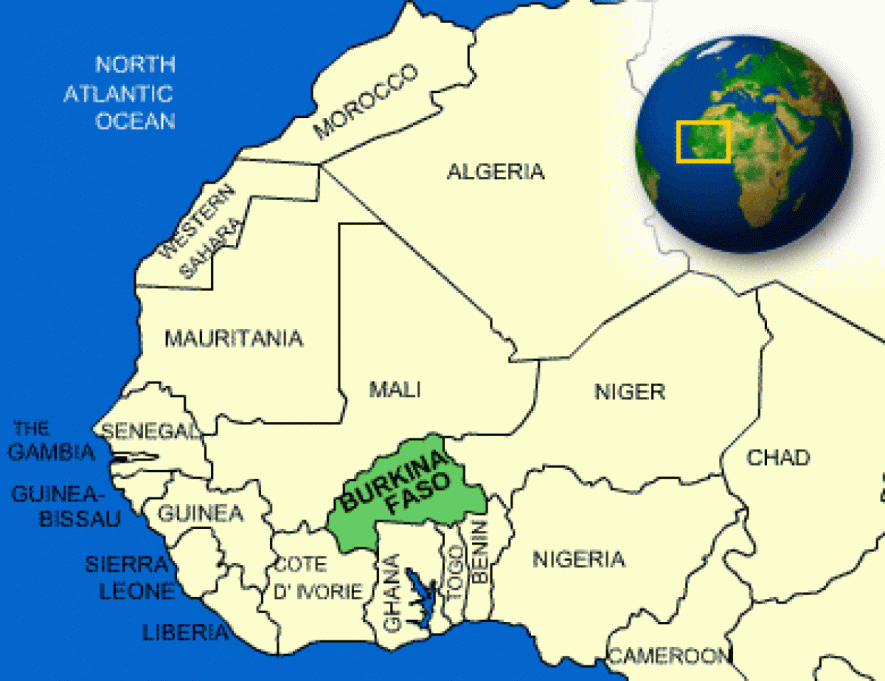“Terrorist Attack in Burkina Faso an Attempt to Restore Compaoré Regime”

Le Balai Citoyen (Citizens Broom), a political movement in Burkina Faso that upholds the legacy of revolutionary icon Captain Thomas Sankara, has termed the recent terrorist attack in the country a ploy to revive the regime of former President Blaise Compaoré. Compaoré, once a top associate of President Sankara, organized a coup in 1987 in which the latter was killed. Compaoré was in power until he was overthrown in a popular insurrection in 2014.
On March 2, terrorists attacked the headquarters of the Armed Forces and the French Embassy in the capital Ouagadougou, killing 8 soldiers. A Mali-based affiliate of al Qaeda claimed responsibility for the attacks. The attacks took place just four days before a trial of soldiers involved in a coup attempt in 2015. Le Balai Citoyen’s statement pointed to the links between the terrorists who attacked on March 2 and those involved in the coup.
French forces are currently deployed in the Sahel region of the country as part of Operation Barkhane. Many argue that France, the former colonial power in the country, played a pivotal role in the Compaoré-led coup.
In a statement Le Balai Citoyen said: “We bow before the memories of our martyred soldiers. Our movement expresses our condolences to the families of the victims and wishes a speedy recovery to the wounded. Our thoughts also go to the entire Defense and Security Forces in the national territory and in particular to those who intervened at the French Embassy and at the Headquarters of the Armed Forces, for neutralizing the eight assailants.”
The coordinated and precision attack at the highly-guarded military facilities could not have been possible without the support of either military deserters or infiltrators inside the armed forces, the statement noted. In order for the headquarters of the Armed Forces to be attacked, the terrorists had to be well informed about their target. “Initial information provided by the investigation leads us to believe that the terrorists had a specific objective, to annihilate senior officers of our Army,” the statement added. Le Balai Citoyen also expressed concerns regarding the implications of the attack. “Many Burkinabè (residents of Burkina Faso) wonder if the security system is infiltrated? If it is infiltrated, to what level, by whom, for whom, and with what purpose?”
The movement said the sequence of events around the attacks points to a deep conspiracy around the trial of the soldiers involved in the September 2015 coup. Those on trial had attempted to overthrow the transitional government of President Michel Kafando. The soldiers belonged to the Regiment of Presidential Security (RSP) – a controversial autonomous military unit formed under President Compaoré. The failed coup of 2015 was seen as an attempt to bring back Compaoré, who was overthrown in the aftermath of the Burkinabé uprising of 2014. The massive movement, which led to his ousting, began after Compaoré tried to change the Constitution to allow him to run again and extend his 27-year rule.
The movement noted that immediately after the attack, the trial of the RSP members was postponed. “The relationship between the coup supporters and the leaders of the terrorist group who claimed responsibility for the attack is a secret to no one” noted Le Balai Citoyen.
The movement further added that “The strategy of those accused of the coup is well known. It is a question of delaying the trial as much as possible in the hope that any event, say a catastrophe of some kind, will occur in their favor.”
According to reports, the RSP was preparing to activate its terrorist networks to counter those who resisted the coup of September 2015. Many argue that the March 2 attack was a consequence of this. Gilbert Diendéré, the right-hand man of Compaoré and leader of the 2015 coup, is known to have been in regular communication with terrorist groups in the region through his Mauritanian interlocutor, Moustapha Limam Chafi, before Compaoré was overthrown. Compaoré’s circle seems to be still using their connections inside the terrorist groups to revive his regime by ‘beheading’ the senior military leadership in the country, according to reports from the region.
The terrorist group Jama’a Nusrat ul-Islam wa al-Muslimin (JNIM), in a statement claiming responsibility for the attack.
The JNIM and Blaise Compaoré’s regime had a close relationship and according to Le Balai Citoyen, this is not surprising since it was known that the leader of the terrorist group, Iyag Ag Ghali and his men were taking up residence in Ouagadougou under the protection of the then President Compaoré and his senior officers.
“Our movement and the Burkinabè people still remember the attacks that took place at the Nazinon Bridge and Yimdi's powder keg. All these attacks by Burkinabe military deserters after the failure of the coup that caused the death of 15 people and wounded several others, had a single goal: releasing Generals Bassolet and Diendéré incarcerated at the MACA (Armed Forces Correction Facility),” Le Balai Citoyen said the statement.
What is Operation Barkhane?
Operation Barkhane is the successor to Operation Serval (January 2013) and aims at eliminating terrorist groups from northern Mali. Around 3,000 French soldiers are deployed as part of the operation in four permanent bases located in five countries. The headquarters of the operation and the air force is in the Chadian capital of N’Djamena; a regional base is located in Gao, north Mali, with at least 1,000 men; a special-forces base is in Burkina Faso’s capital, Ouagadougou; an intelligence base is in Niger’s capital, Niamey, with over 300 men; and an air base is in Niamey. There is also a temporary base in Mauritania. All the countries are former French colonies.
Get the latest reports & analysis with people's perspective on Protests, movements & deep analytical videos, discussions of the current affairs in your Telegram app. Subscribe to NewsClick's Telegram channel & get Real-Time updates on stories, as they get published on our website.















